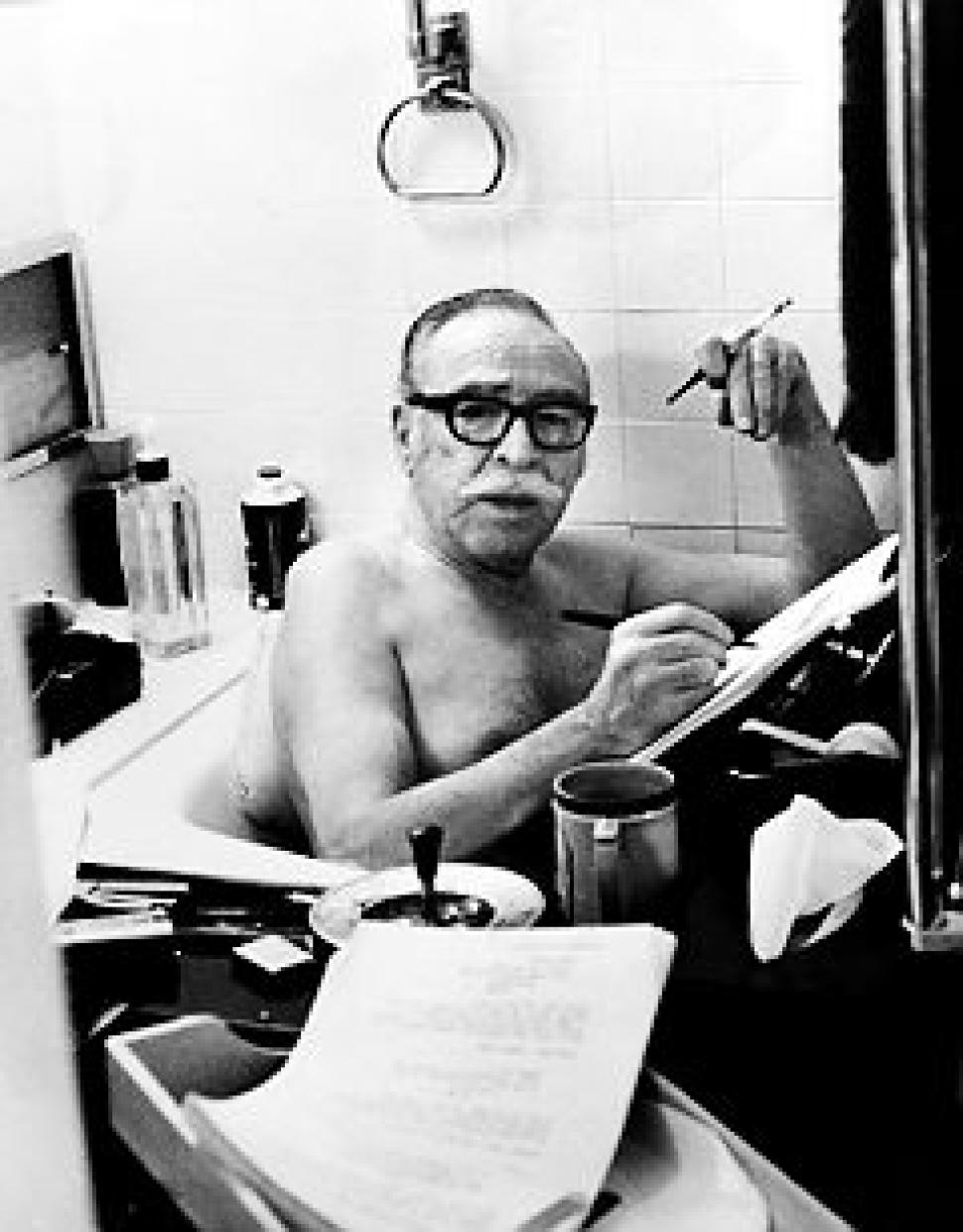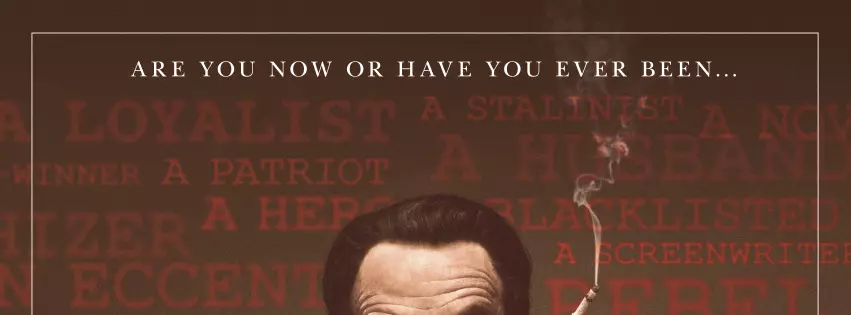Trumbo (Movie Review)

Dalton Trumbo (1905-1976)
“Trumbo” reminds us that tyranny doesn’t produce any heroes or villains. There are only victims.
Nobody wins. Everybody loses.
Some victims lose far more than others, and arguably no collective group of artists suffered more hardships during the fear-ridden Red Scare of the mid-1950s than the famed or infamous “Hollywood Ten” — the adjective depending upon one’s political leanings.
Those receiving subpoenas to testify in front of the House Un-American Activities and later convicted of “Contempt of Congress” charges included successful screenwriters and film directors who were not just blacklisted but later imprisoned in some cases. Guilty of thought crimes for once allegedly being members of Communist Party USA, or suspected sympathizers who refused to name their so-called conspirators, the Hollywood Blacklist imposed by all the major movie studios for more than a decade ruined careers, caused bankruptcies, broke up families, and even instigated suicides.
“Trumbo,” tells one such story through the experiences of the title character. The real Dalton Trumbo penned three Academy Award-winning screenplays but wasn’t credited with his own work using his real name until long after the damage had already been done. After serving time in a federal penitentiary, Trumbo returned to Hollywood out of work and virtually unemployable. So, he assumed different pseudonyms and wrote numerous screenplays for low-budget horror filmmakers and makers of B-grade westerns enabling him to support his saintly wife and three devoted children.
But talent is often difficult to conceal. When Trumbo accepts two mainstream writing projects which both end up winning Oscars for Best Screenplay, he’s forced to remain hidden in darkness and silence while watching clueless proxies receive honors that should rightfully have been his. Rumors begin to swirl. When the outspoken and politically conservative gossip columnist Hedda Hopper breaks the scandalous story in a series of nationally-syndicated exclusives read my millions, his cover was blown. By 1960, the entire charade appeared ready to collapse.
That’s when actor Kirk Douglas, then one of the world’s most bankable movie stars, showed remarkable courage in the face of overwhelmingly powerful forces — both in Hollywood and Washington. He stepped in and approached Trumbo with an extraordinary offer to completely overhaul an early mess of a script for “Spartacus,” a major studio production that had been floundering and was desperately in need of revision. The story of a lowly slave who rises up and leads a mass revolt against the mighty Roman Empire was the perfect vehicle within Trumbo’s ideological wheelhouse. As they say, the rest is history.
At about the same time, movie director Otto Preminger made similar overtures to Trumbo, asking him to write the screenplay for the 1961 classic “Exodus,” starring Paul Newman. That too becomes a landmark film achievement. To this day, there’s still controversy and even some debate as to who should be credited most with breaking the Hollywood Blacklist. However, Douglas and Preminger were certainly instrumental figures and catalysts who risked their own careers and reputations for the sake of justice and the fundamental right to free speech, when mass cowardice prevailed.
Several other movies have been made previously about blacklisting, but none is quite as up close and personal as this intimate portrait of “Trumbo.” Perhaps most intriguing was the 1972 love story, “The Way We Were,” which ironically was co-scripted by Trumbo. In addition to movie epics “Spartacus” and “Exodus,” Trumbo also wrote “Roman Holiday,” “The Brave One,” “Lonely are the Brave, “The Sandpiper,” “The Horseman,” “Papillon,” and 60 other movies over the course of his prolific career between 1936 and 2008 (several movies were made following his death based on his screenplays).
This film is carried almost entirely by the masterful exuberance of Bryan Cranston as Trumbo, who merits serious “Best Actor” consideration when this year’s Oscar nominations are announced. Cranston blends just the right mix of personal conviction and wit in what’s clearly a challenging role, but one which also requires sensitivity and vulnerability to accrue the audience’s sympathy. The same appeal that worked well for actor-director Warren Beatty in “Reds,” a 1982 film about Jack Reed, a Marxist writer, and revolutionary, works here too, for the most part. Still, this film and its divisive message are likely to be much better received by liberals than conservatives, particularly as silver screen legend John Wayne, once the face of American patriotism, comes across as an amalgamation of Wayne LaPierre and Donald Trump.
Directed by Jay Roach and written by John McNamara, “Trumbo” is undoubtedly a flawed movie, with uneven pacing and clashing inflections, albeit with standout supporting performances from Helen Mirren (Hedda Hopper), Diane Lane (Mrs. Trumbo), Louis C.K. (writer Arlen Hird), and John Goodman (a slimy movie producer). The lesser-known actors playing two bona fide screen legends Douglas and Preminger are also remarkably convincing. Yet the movie wavers back and forth between being too camp and cute and overly preachy and gets mired down by unmistakably channeling the Coen Brothers (recall “Barton Fink”). The conclusion is also less than satisfying, failing to deliver on a two-hour crescendo that presumes we should rise to our feet and cheer. Nonetheless, even with these setbacks this is a film deserving praise and meriting attention.
We’re inching dangerously closer to times like the mid-1950s when political pressures are mounting and entire groups of people become social outcasts, based merely on fear and suspicion. While we’d like to believe the ugly lessons of the past have been learned. In fact, they appear to have been forgotten. We’re in serious danger of relapse. To that extent alone, “Trumbo” isn’t just an intriguing style period piece about a gifted Hollywood writer who outfoxed the political system and was ultimately redeemed. More important, it’s a warning sign as to the dangers of what happens when tyrants rule in reaction to collective fear.
Clearly, the former requires the latter.













